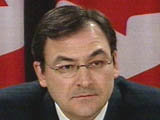
'Kids come first' in new divorce law
Canadian Broadcasting Corporation (CBC) December 11, 2002
OTTAWA - The federal government is proposing changes to the divorce law aimed at reducing conflict and making life easier for children in family break ups, Justice Minister Martin Cauchon said Tuesday.

"Kids come first," he said.
The words "custody" and "access" will disappear from the legislation, as part of an effort to remove the idea of winners and losers from divorces.
Under the new system, "parents don't have rights vis-a-vis the child. They have responsibilities," Cauchon said. The new model will be "a less-adversarial system."
But he was unable to explain to reporters exactly what would change for the child of divorcing parents, other than to say "the approach."
Judges will be given a list of criteria to consider when making a parenting order. Today there are no formal criteria.
There are more than 1.3 million single-parent families in Canada, and 43 per cent of Canadian marriages end in divorce.
Cauchon said there will be more family services, legislative reform and more family courts.
More Judges
The federal government will commit $63 million over five years
to the project. Ottawa will contribute $16.1 million a year to pay for 62 new
judges (46 promoted from provincial courts) for family courts.
That should speed up the system, and the hope is the provinces
will reinvest the money they save on the judges' salaries to
pay for family justice services.
Many family law experts say the money's not enough.
"Even if all of that were to go to mediation, over a five year period, over all of the provinces and territories, it seems to me to be generally inadequate to do a fair and competent job in resolving conflict with children," said Toronto divorce lawyer Joel Miller.
The changes will encourage the parents to seek mediation and counselling to resolve custody disputes, with Ottawa paying some of the costs.
Cauchon rejected calls from critics for a more radical change to the divorce laws.
A special parliamentary committee on child custody recommended that "shared parenting" is the only concept that would ensure both parents play a significant role in their children's lives after a divorce.
Written by CBC News Online staff



